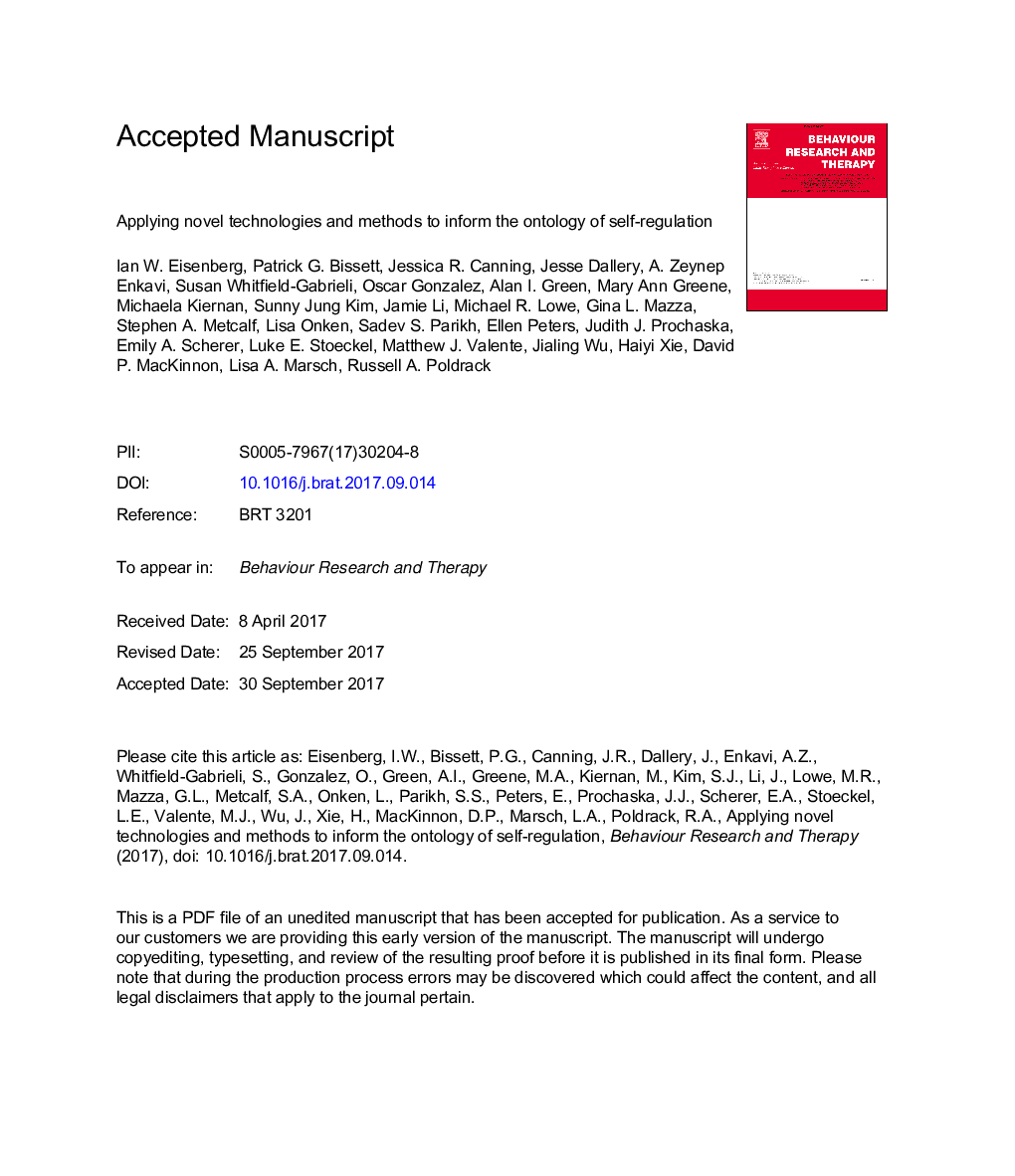| کد مقاله | کد نشریه | سال انتشار | مقاله انگلیسی | نسخه تمام متن |
|---|---|---|---|---|
| 7261905 | 1472748 | 2018 | 43 صفحه PDF | دانلود رایگان |
عنوان انگلیسی مقاله ISI
Applying novel technologies and methods to inform the ontology of self-regulation
ترجمه فارسی عنوان
استفاده از فن آوری های نوین و روش های اطلاع رسانی هستی شناسی خودمراقبتی
دانلود مقاله + سفارش ترجمه
دانلود مقاله ISI انگلیسی
رایگان برای ایرانیان
کلمات کلیدی
خود تنظیم هستی شناسی، تصویر برداری عصبی، مداخله، چاقی، سیگار کشیدن،
ترجمه چکیده
خود تنظیمی یک ساختار وسیع است که نشان دهنده توانایی عمومی برای جذب منابع شناختی، انگیزشی و عاطفی برای دستیابی به اهداف بلند مدت است. این ساختار در تعدادی از رفتارهای خطرناک قرار گرفته است و یک هدف امیدوار کننده برای تقویت تغییر رفتار سودمند است. علیرغم اهمیت روشن آن، مولفه های رفتاری، روانشناختی و عصبی خودارزیابی هنوز ضعیف درک نشده است، که به ناسازگاری های نظری منجر می شود و مانع پیشرفت مداومی مؤثر می شود. ما یک برنامه تحقیقاتی را برای تعریف یک هستیشناسی عصبی-روانشناختی خودمراقبتی، تفسیر اجزای شناختی که خود تنظیم، روابط آنها و اندازه گیری های مرتبط با آن را تشکیل می دهند، معرفی می کنیم. هستی شناسی توسط دو روش بزرگ در ارزیابی تفاوت های فردی مطلع خواهد شد: ابتدا صرفا رفتارانه با استفاده از داده های جمع آوری شده از طریق مکانیکی ترک آمازون، و سپس با داده های عصبی تصویری جمع آوری شده از یک جمعیت جداگانه جمع آوری می شود. برای تأیید هستی شناسی و نشان دادن کاربرد آن، پس از آن ما برای استفاده از رفتارهای خطر بهداشتی در دو گروه رفتاری نمونه: اضافه وزن و چاقی بزرگسالان که خوردن غذا و سیگاری ها را دارند، استفاده می کنیم. پس از شناسایی اهداف هستی شناختی که رفتار ناسازگار را تسریع می کنند، ما مداخله هایی را انجام خواهیم داد که این اهداف را درگیر می کنند. اگر موفقیت آمیز باشد، این کار حسابداری کامل و جامع از خود تنظیم را به شکل هستی شناسی صریح، که بهتر خواهد شد الگوی کسری بودجه مربوط به رفتار بهداشتی ناسازگار را بهتر و جهت مداخلات تغییر رفتار رفتاری بهتر فراهم می کند.
موضوعات مرتبط
علوم پزشکی و سلامت
پزشکی و دندانپزشکی
روانپزشکی و بهداشت روانی
چکیده انگلیسی
Self-regulation is a broad construct representing the general ability to recruit cognitive, motivational and emotional resources to achieve long-term goals. This construct has been implicated in a host of health-risk behaviors, and is a promising target for fostering beneficial behavior change. Despite its clear importance, the behavioral, psychological and neural components of self-regulation remain poorly understood, which contributes to theoretical inconsistencies and hinders maximally effective intervention development. We outline a research program that seeks to define a neuropsychological ontology of self-regulation, articulating the cognitive components that compose self-regulation, their relationships, and their associated measurements. The ontology will be informed by two large-scale approaches to assessing individual differences: first purely behaviorally using data collected via Amazon's Mechanical Turk, then coupled with neuroimaging data collected from a separate population. To validate the ontology and demonstrate its utility, we will then use it to contextualize health risk behaviors in two exemplar behavioral groups: overweight/obese adults who binge eat and smokers. After identifying ontological targets that precipitate maladaptive behavior, we will craft interventions that engage these targets. If successful, this work will provide a structured, holistic account of self-regulation in the form of an explicit ontology, which will better clarify the pattern of deficits related to maladaptive health behavior, and provide direction for more effective behavior change interventions.
ناشر
Database: Elsevier - ScienceDirect (ساینس دایرکت)
Journal: Behaviour Research and Therapy - Volume 101, February 2018, Pages 46-57
Journal: Behaviour Research and Therapy - Volume 101, February 2018, Pages 46-57
نویسندگان
Ian W. Eisenberg, Patrick G. Bissett, Jessica R. Canning, Jesse Dallery, A. Zeynep Enkavi, Susan Whitfield-Gabrieli, Oscar Gonzalez, Alan I. Green, Mary Ann Greene, Michaela Kiernan, Sunny Jung Kim, Jamie Li, Michael R. Lowe, Gina L. Mazza,
